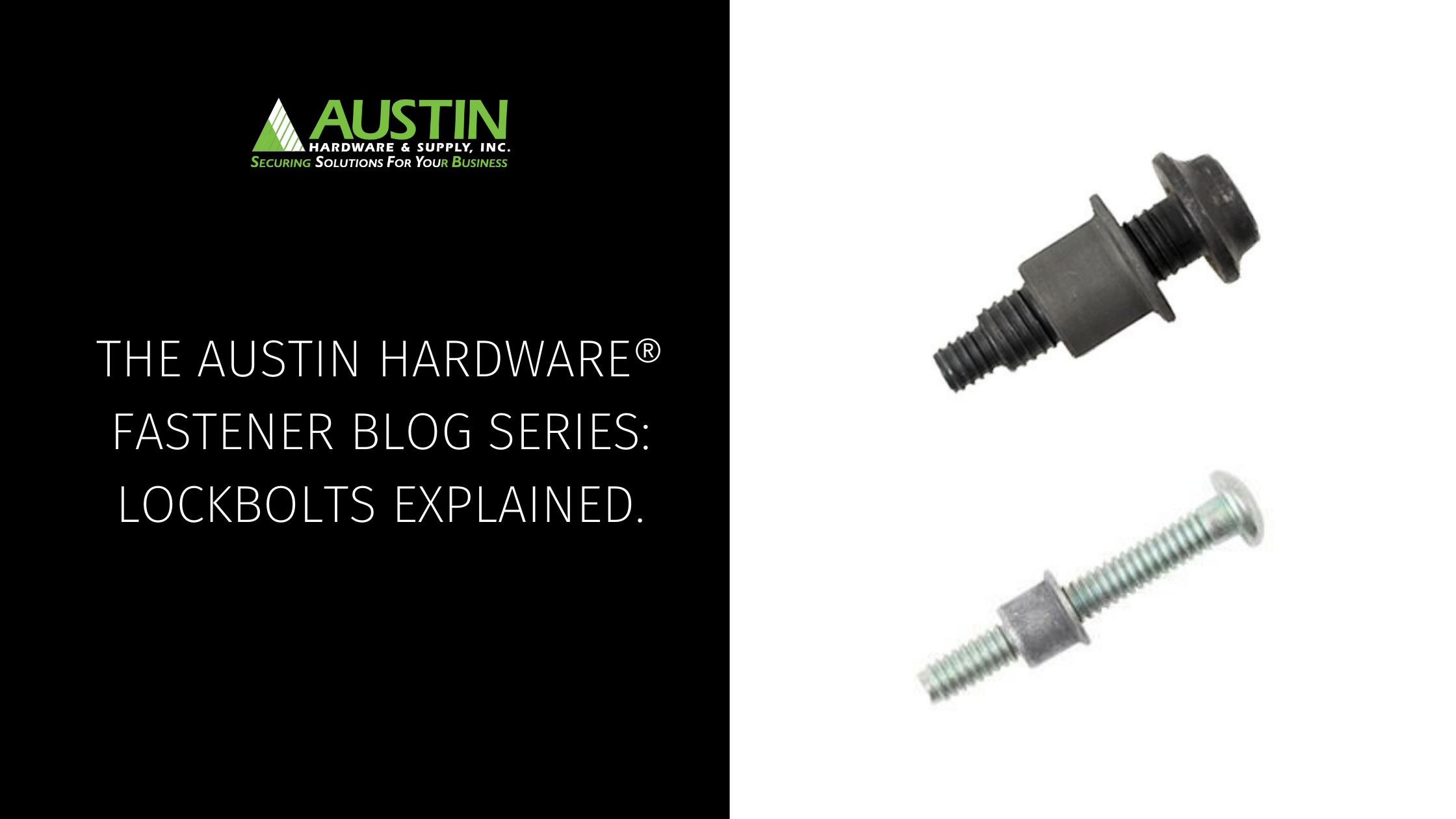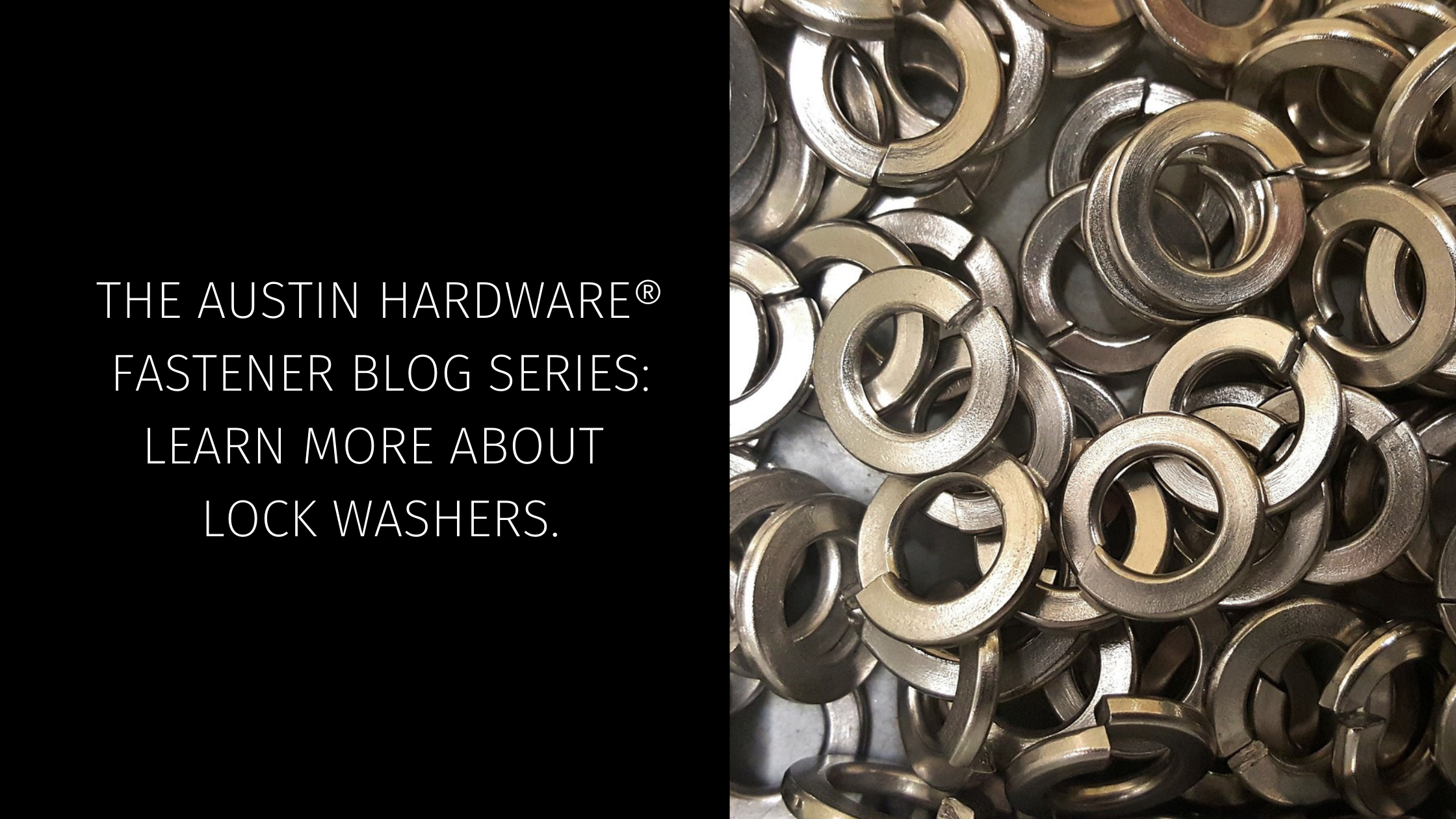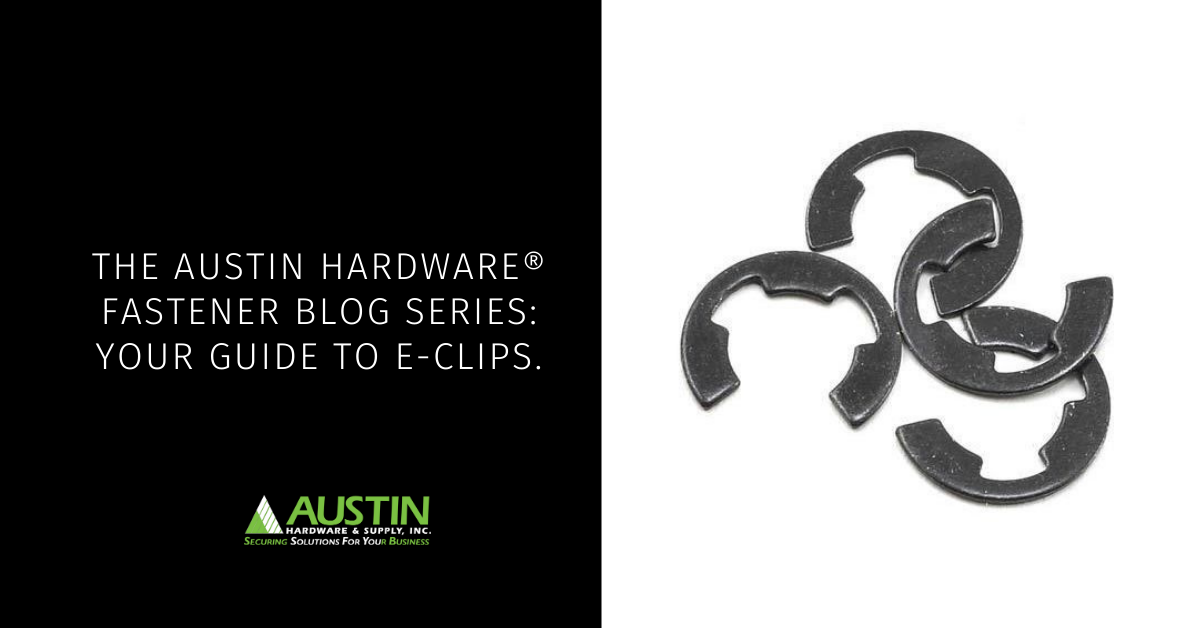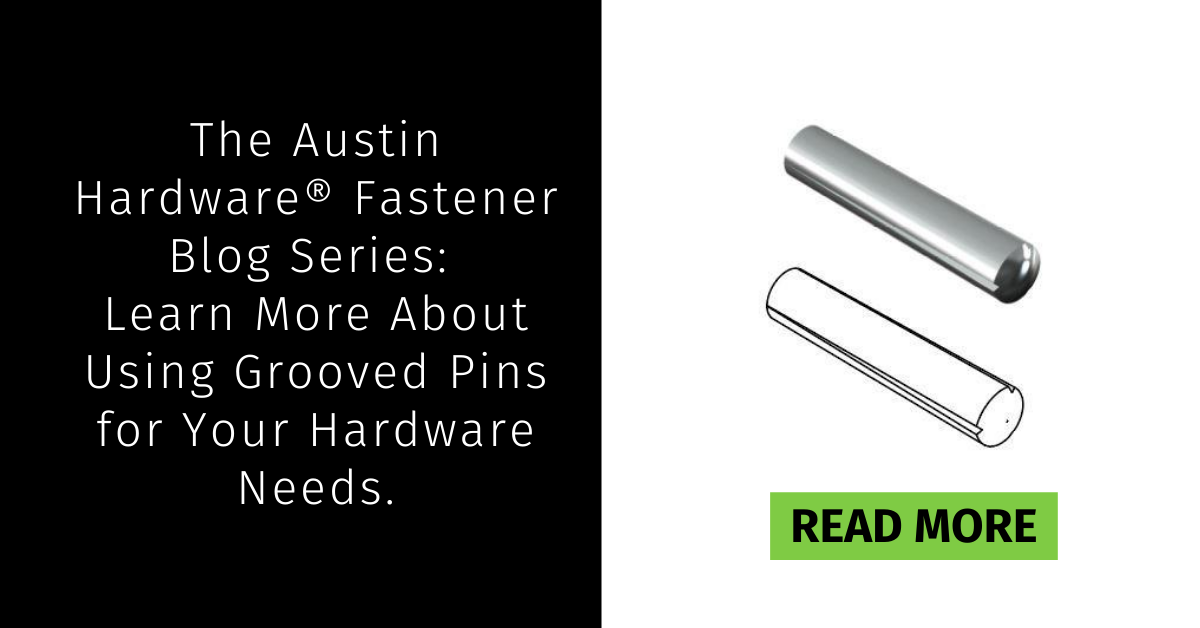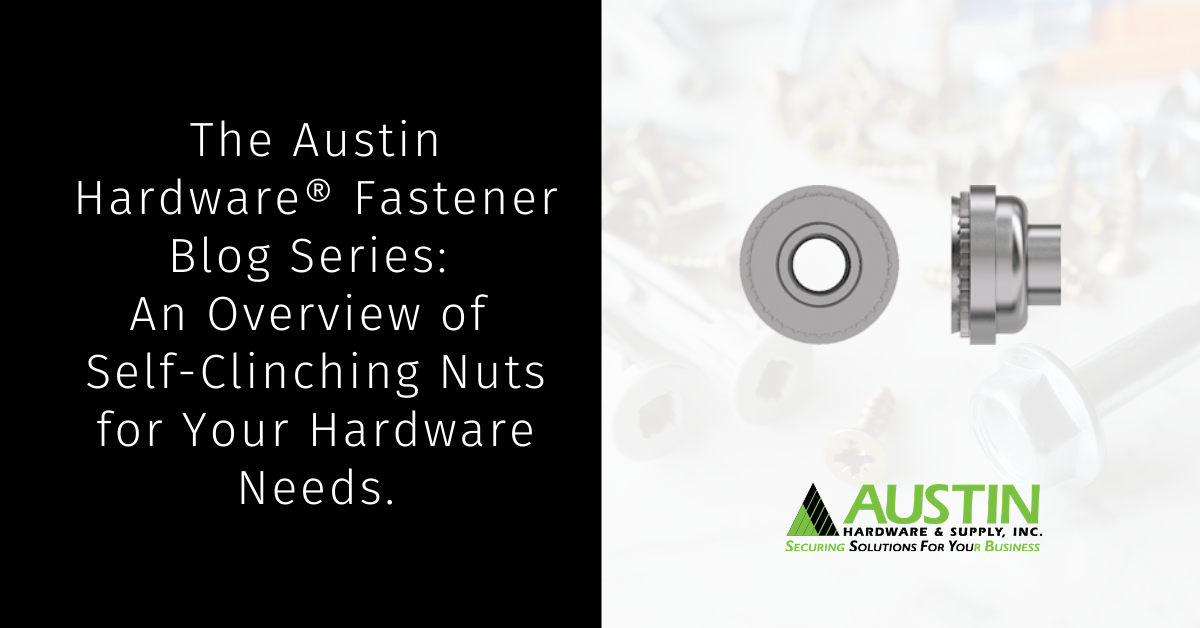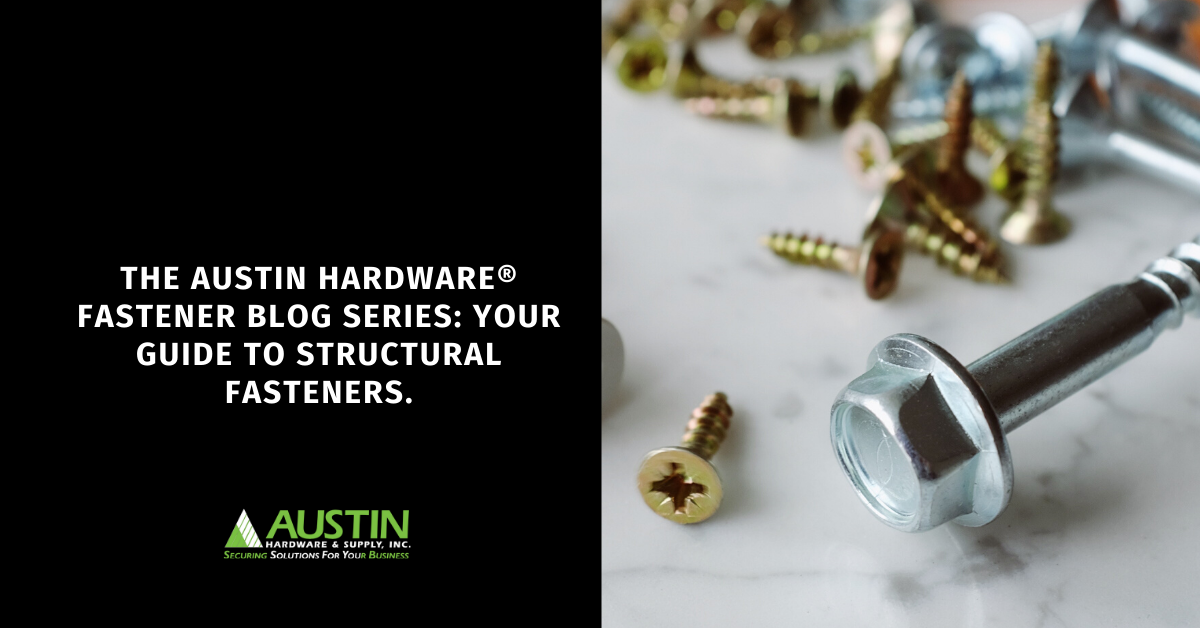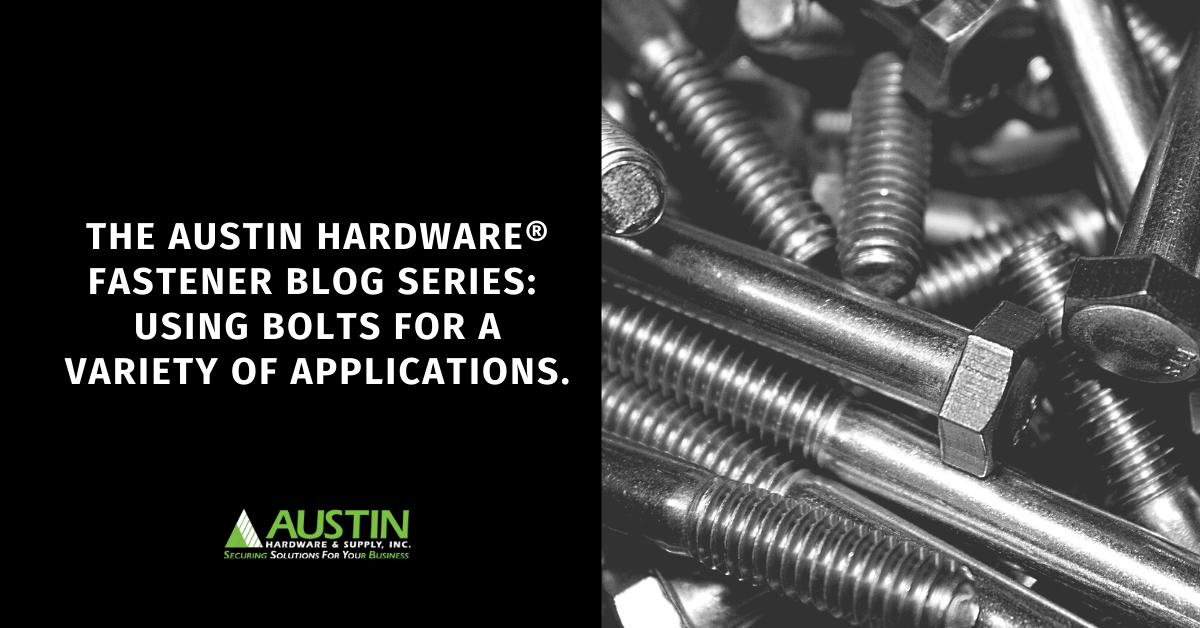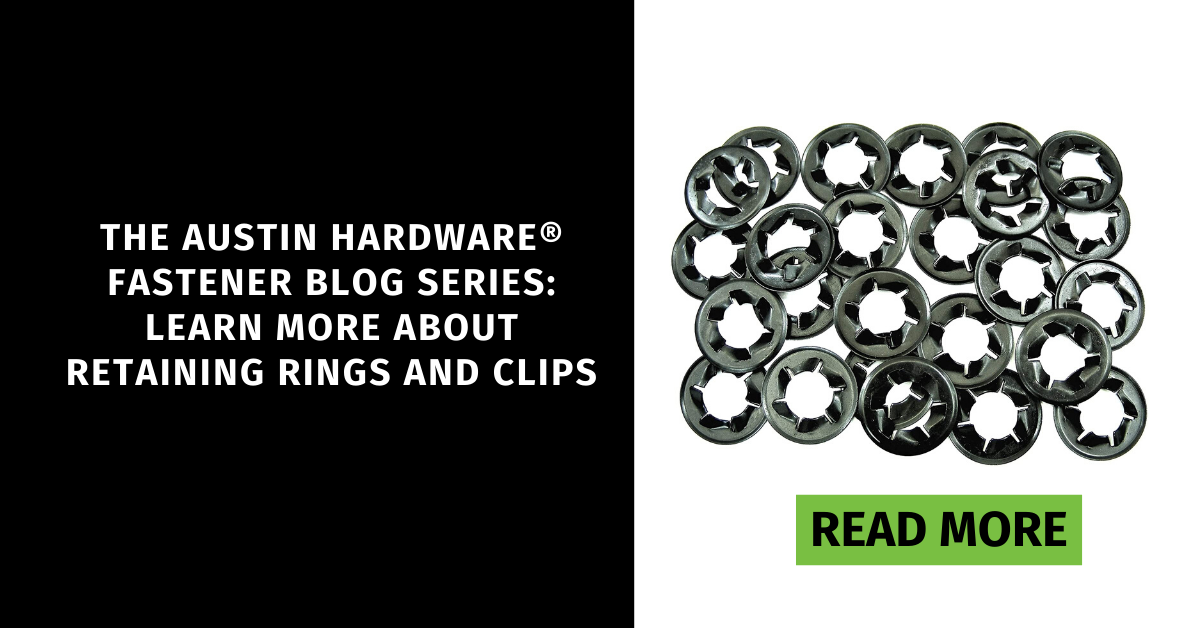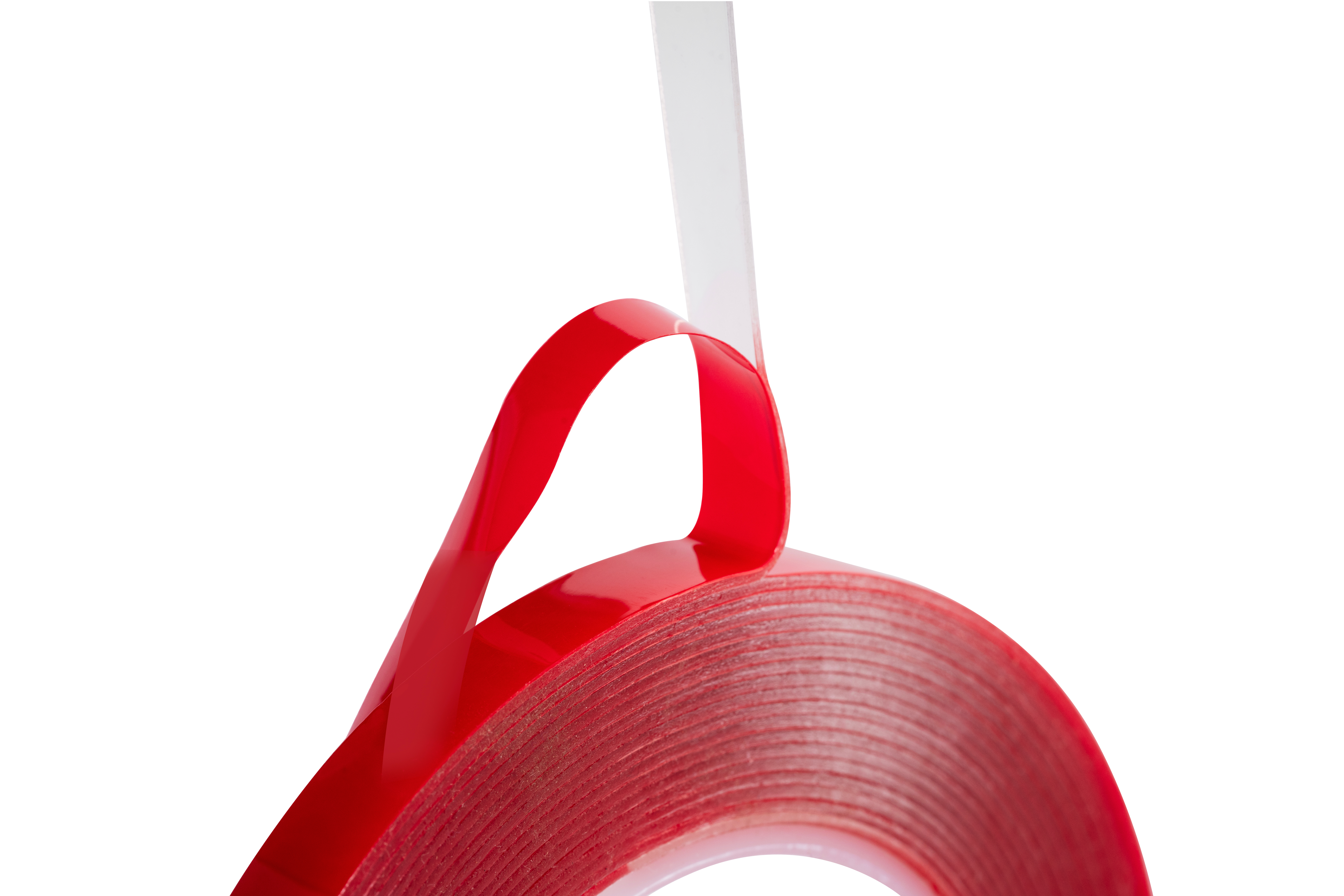In an earlier post on structural fasteners, we began discussion on lockbolts. A lockbolt is a 2-piece, permanent, mechanically locked structural fastener. Their primary benefit is that they offer long-lasting vibration resistance and won't loosen even under the most extreme vibration. This is because an installed, fully swaged (cold-formed collar on the grooved pin) lockbolt has no gaps between the grooves of the pin and the swaged collar, as found in threaded fasteners such as nuts and bolts. It's essentially a best-of-both-worlds hybrid of a bolt and a rivet.
The Austin Hardware® Fastener Blog Series: Lockbolts Explained.
Topics: fasteners
The Austin Hardware® Fastener Blog Series: Learn More About Lock Washers.
Lock washers work on the fastener's nut side, supplying added tension to an assembly to help prevent nuts and bolts from turning, slipping, and coming loose due to vibration and torque. Thus, their use is common in the transportation industry and on commercial products such as washing machines, where vibration is a significant factor.
Topics: fasteners
The Austin Hardware® Fastener Blog Series: Your Guide to E-Clips.
E-Clips are a radially assembled tapered section retaining ring. With three points of contact they provide a larger surface for retaining, and yield a higher thrust load capacity than other types of external rings.
As discussed in a previous post, retaining rings are designed to restrict the movement of mating components and keep them securely in place during operation. By creating a shoulder to retain the assembly, retaining rings are a cost-effective solution, reducing the need for threaded fasteners or machining shoulders on to components. They can be used to replace cotter pins or other traditional fasteners in a number of applications.
Composed of thin metal, retaining rings are generally either stamped, machined, or made from coiled wire.
They function by being fitted into a machined groove, either on the inside of a bore, or the outside of a shaft. Once in place they reduce vibration, maintain placement of two parts of an assembly, and withstand axial loading.
Topics: fasteners
The Austin Hardware® Fastener Blog Series: Learn More About Using Grooved Pins for Your Hardware Needs.
A grooved pin is a solid pin, similar to a dowel, except with swaged grooves (or flutes) that run vertically. Ordinarily, there are three grooves that can vary in length. They can run the entire way down the pin to as little as just one-third the length.
Applications:
- Locking collars
- Linkage or Hinge Pin
- Valve T-handle
- Spring anchor
- Roller and Stop pins
Typically, sizes range from 1/16” to ½” in diameter, with lengths up to 3-3/4”. Grooved pins generally are used in friction fit holes, creating a connection that is almost as strong as a dowel with the added benefit of excellent vibration resistance.
The primary functional difference between a grooved pin and a dowel is that, while displaced material of the swaged grooves increases the pin’s diameter, the grooves close when pressed into a hole. This makes grooved pins appreciably more pliable than dowels, resulting in pins that can be used in holes that may not be formed to an exact size or circular shape. Tolerances for a dowel are considerably tighter. Grooved pins can also be removed and reused more easily because of their enhanced pliability.
Topics: fasteners
The Austin Hardware® Fastener Blog Series: An Overview of Self-Clinching Nuts for Your Hardware Needs.
In a previous post, we discussed in broad terms the basics of self-clinching fasteners. We noted that self-clinching fasteners are typically used for metal assemblies that may be too thin for tapping or in applications where it’s not feasible to employ stamped or extruded threads. They’re found in everything from household appliances and electronics to medical, telecom, and automotive equipment.
The three primary forms of self-clinching fasteners are Nuts, Studs, and Standoffs. Standoffs are used most often in Printed Circuit Boards and electrical assemblies to protect the circuitry. Studs present a threaded fastener into the product allowing for the mounting of essential components. We’ll dive deeper into those two specific self-clinching fasteners in future posts.
This blog is going to take a little closer look at self-clinching nuts.
Self-clinching nuts provide strong, load-bearing threads to accept bolts and screws in thin sheet metal applications. They’re typically pressed into the metal using a manual or hydraulic press and swage the surrounding metal, which makes them a strong and permanently affixed component.
Topics: fasteners
The Austin Hardware® Fastener Blog Series: Your Guide to Structural Fasteners.
The meaning of the term "structural fastener" is somewhat ambiguous. Here's what it used to mean:
As recently as a January 2020 article by ITA Fasteners, structural fasteners are described as being, "… characterized by strong, heavy-duty materials that facilitate the construction of structures employing steel to steel connections. They are an ideal choice … for connecting one metal structure to another."
While not inaccurate, according to Steave Klein, National Sales Manager for Fasteners at Austin Hardware®, "That phrasing comes from a time when steel was the strongest material available for construction and structural applications. In the modern world of today, while steel is still commonly used in all types of manufacturing, we also have many other materials, some of which are stronger than steel, and due to some of their other characteristics, better suited to certain load-bearing applications."
Topics: fasteners
The Austin Hardware® Fastener Blog Series: Your Guide to Solid Rivets.
A Wikipedia citing notes that, “Solid rivets are one of the oldest and most reliable types of fasteners, having been found in archaeological findings dating back to the Bronze Age.” According to ThomasNet, Solid rivets “With their full-bodied design, solid rivets represent the strongest of the rivet varieties and, installed red-hot, were the rivets employed in structural-steel buildings and the like before bolted- and welded-joint techniques supplanted them.” Solid rivets are one of the strongest permanent fasteners and are commonly used in applications where safety and reliability are of the utmost importance. This is why they are used frequently in the aircraft and auto industries.
Topics: fasteners
The Austin Hardware® Fastener Blog Series: Using Bolts for a Variety of Applications.
Like most fasteners, bolts are available in a wide variety of styles and materials to meet the needs of a world of applications. In the industrial world, carbon and alloy steel bolts are used most often. Steel bolts can be divided into two major categories: High Strength Structural and Common.
Steel bolts are rated and specified by numerous certifying bodies, but the two primary associations in the United States are ASTM International (formerly American Society for Testing and Materials) and the SAE International (formerly Society for Automotive Engineers). ASTM standards for bolts and fasteners pertain primarily to construction applications, while SAE deals with machinery and automotive applications as well as those for original equipment manufacturing.
High Strength Structural Steel Bolts are typically used to join steel structures in construction. They’re mostly composed of quenched or tempered steel and have a minimum tensile strength of 120 ksi for use in structural connections. Examples are ASTM rated A325 and A490, Types 1 and 3 structural hex bolts.
Topics: Innovative Solutions, fasteners
The Austin Hardware® Fastener Blog Series: Learn More About Retaining Rings and Clips
Retaining rings can be an alternative to traditional threaded fasteners for holding components in a housing or on a shaft. They’re installed inside a housing or bore, or into a groove on a shaft to create a shoulder which retains an assembly. They eliminate threading, tapping, drilling and other machining operations associated with screws, nuts, bolts, etc. Because the grooves required for using retaining rings can be machined with other processes, they can help reduce production costs. Retaining rings are more compact than traditional fasteners but no less functional. They can also impact the cost of raw materials and labor, as well as reduce the weight of an end product.
There are two primary types and four main styles of retaining rings.
Topics: fasteners
The Austin Hardware® Fastener Blog Series: An Overview of Washer Hardware Options.
Washers are another critical member of the wide world of fasteners. They’re certainly not sexy and can be overlooked at times. However, they play a crucial role in the function and longevity of the majority of products using mechanical fasteners. Like most fasteners, there are many different types and sub-types, with the application ultimately driving the appropriate selection.
According to Engineering360, washers are “… disks of metal or non-metallic material placed beneath a nut, an axle bearing, or a joint, to relieve friction, prevent leakage, isolate, prevent loosening, or distribute pressure.”
Most people are likely familiar with the typical “Type A plain washer,” otherwise known as a flat washer. These are considered general-purpose washers and are used in myriad applications.
SAE washers are similar to Type A plain washers but are thinner and approved by the Society of Automotive Engineers for use with fine thread bolts and nuts. Other major categories of washers include Spring or Disc washers (of which there are many styles), Lock washers, Torque washers, and more. We’ll break down the different types of washers and their applications in more detail in future posts. Today’s entry will focus on the common attributes of each washer.
While very important, the basics of common washer attributes break down quite simply into size, thickness, and material.
Topics: Products (General), fasteners


